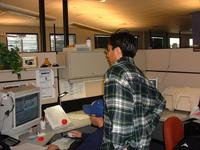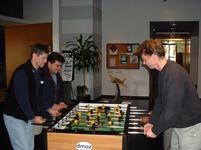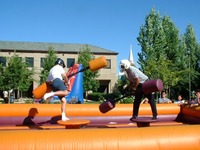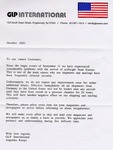 |
| Angelika/Mike Schilli |
|
At the entrance to the Netscape campus, which consists of around 10 buildings, not only the Netscape "N" but also the AOL logo has been displayed since AOL acquired Netscape. By the way, Netscape only rented the buildings and recently gave up some of them. About a year ago, at the height of the dot-com bubble, the company Veritas agreed to lease them for $600 million for 10 years. Now, of course, the entire market has collapsed, and negotiations with the landlord have been reopened. It was agreed that Veritas could now purchase the buildings for $280 million. Imagine that, the buildings are changing hands for half of the originally negotiated rental price! Even the fountain with the Netscape logo, in front of which Netscape founder Marc Andreessen liked to pose for newspapers, was sold off: it is now adorned with the logo of the company "Verisign."
But enough of the gloomy predictions. Listen to your Silicon Valley maverick rambling on before everything finally collapses:
Between the beige buildings, there are park benches and fountains so that people can relax. Those whippersnappers! The new boss of Netscape is somehow 26 years old. And I always feel ancient when I look at my colleagues who have just graduated from university. Oh well, our youngens still have a lot to learn!
The dress code at Netscape is, of course, California casual. I don't think I've seen anyone wearing a tie in my four years here. In the summer, shorts and T-shirts are the norm, and baseball caps are also popular. Recently, I've been getting terrible blisters when wearing leather shoes, as I've only worn sneakers or Birkenstocks for the past five years. At home in the closet, there's a jacket, a shirt, a tie, and a "nice" pair of pants sealed in a plastic cover--just in case the worst-case scenario happens and I have to present myself somewhere. Until then, the plastic stays on.
There is also pool billiards, foosball tables, a mini-golf course, an outdoor beach volleyball court, basketball courts, a roller hockey rink, and a putting green for golfers. A dedicated fitness center with treadmills, weight machines, various modern equipment, and showers has also been built. The underlying idea, of course, is that almost any price is justified to keep people at the company as long as possible. Recently, I read an article stating that every manager of software developers must ask themselves what they are doing wrong if people are already going home at 6 p.m ("Managing Software Engineers")
I have, by the way, set up a small program that implements a table tennis ranking system and is becoming increasingly popular. People in the department can challenge each other and improve their rank by competing against one another according to meticulously established rules, set by me.
Additionally, there is a small webcam (computer camera) in the table tennis room that takes a picture of the room every minute. This allows you to observe the room from your workstation using a regular web browser and see if the table tennis table is currently available for a match.
But as I said, those times are over: Such equipment can currently be purchased cheaply at foreclosure auctions by bankrupt so-called "DotCom" companies. This, of course, also affects the rest of the economy, because when the Silicon Jockeys are no longer earning millions, they are not throwing money around with full hands anymore. For example, the company that used to wash and wax cars by hand once a week in the Netscape parking lot recently went bankrupt. Tough times are also approaching for party organizers, T-shirt printers, and game equipment manufacturers.
San Francisco's luxury restaurants also depended on internet companies, teams used to have their upscale lunches there. Now they're closing down one after the other. The "$1000 dresser but the drawers don't close properly" furniture stores are groaning under the economic crisis. Landlords have to leave "$2000 for two small rooms but the plaster is falling off the walls" apartments vacant. What a disaster!

















